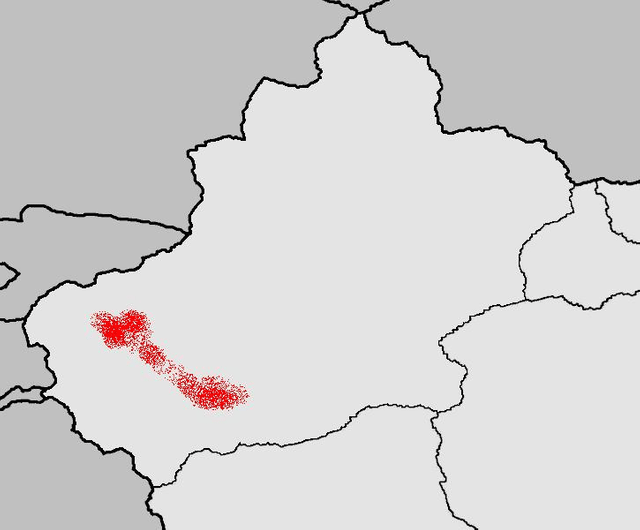Äynu language

Äynu language
Äynu (also Aini, Ejnu,[3] Abdal)[1] is a Turkic cryptolect spoken in Western China known in various spelling as Aini, Aynu, Ainu, Eyni or by the Uyghur Abdal (ئابدال), in Russian sources Эйну́, Айну, Абдал, by the Chinese as Ainu. Some linguists call it a mixed language, having a mostly Turkic grammar, essentially Yugur (close to Uyghur), but a mainly Iranian vocabulary.[4] Other linguists argue that it does not meet the technical requirements of a mixed language.[5] It is spoken by the Äynu, a nomadic people. The Äynu people call their language Äynú (ئەينۇ, [ɛjˈnu]).
Geographic distribution
Äynu is spoken in Western China in the Xinjiang Uyghur Autonomous Region on the edge of the Taklimakan Desert in the Tarim Basin.
Use as a secret language
The only speakers of Äynu are adult men. Uyghur is spoken with outsiders and with women, who do not speak Äynu. Äynu is spoken at home when it is not necessary to disguise one's speech.[6]
Sounds
Consonants
| Labial | Alveolar | Palatal | Velar | Uvular | Glottal | |||||||
|---|---|---|---|---|---|---|---|---|---|---|---|---|
| Plosive | p | b | t | d | k | ɡ | q | |||||
| Affricate | t͡ʃ | d͡ʒ | ||||||||||
| Fricative | v | s | z | ʃ | χ | ʁ | ɦ | |||||
| Nasal | m | n | ŋ | |||||||||
| Flap/Tap | r | |||||||||||
| Lateral | l | |||||||||||
| Approximant | j | |||||||||||
Vowels
Numerals
Äynu numerals are borrowed from Persian:
1 - yäk
2 - du
3 - si
4 - čar
5 - pänǰ
6 - šäš
7 - häp(t)
8 - häš(t)
9 - noh
10 - dah
20 - bist
100 - säd
1000 - hazar